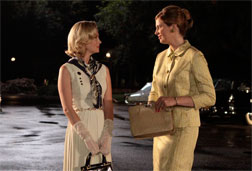Mad Men, Season 3
Week 7: Cheap Tricks

All right, Julia, you have a point about the Connie Hilton line. Maybe Swansburg and I were overthinking it.
I'm glad I wasn't alone in disliking Don's run-in with the pill-poppers. John, you initiated our chat this week by speculating that a memo had gone round the Mad Men offices encouraging "formal experimentation." But you also seem to agree that the motel room smackdown was a gimmick and that, as Julia put it, the "gimmick felt cheap." Maybe I've never shaken off the film classes I took in college, but I tend to love formal experimentation in movies and enjoy it for its own sake even when it's less than completely successful. (A.O. Scott's recent essay on Steven Soderbergh is a meditation on the merits of hit-or-miss innovation, and, full disclosure, I'm a big Soderbergh fan.)
That quick flash in Episode 5 of Sally Draper with blood smeared on her face was experimental and effective: You're left wondering whether it's a literal flashback of Sally as she appeared post-water-fountain brawl or the panicked (and stylized) fantasy of Sally that Betty and Don conjure in their heads.
But flash-forwards are anything but innovative. On the contrary, they're a staple of ratings-driven network TV dramas. (Witness ABC's bid to follow the flash-forward and flashback intensive Lost with a new show based entirely around flash-forwards, called, wait for it, FlashForward.) There's a fine line between formal experimentation and cheap gimmick, and this week I think Weiner and the writers crossed it.
Appropriately enough, the flash-forward structure, where the writers tease us with a provocative image (Don getting hit! Peggy getting some!) and then hope that we sit through three ad breaks to find out what happened, is itself a kind of advertising trick. It's basically an extension of the promo campaign for the show. Think of the absurdly manipulative "scenes from next week" feature at the tail end of each episode. Last week we were treated to an image of an unidentified man face down and presumably dead on the floor and to an unidentified woman asking Betty, "Are you suicidal?" That's pretty ominous stuff, and viewers took to the Fray to speculate about what it all meant.
But it was a cheat! Don got dinged but certainly didn't die. He didn't even lose his Coupe de Ville. And the line about Betty being suicidal came from the Junior League matron remarking on her decision to redecorate so soon after having a baby. That line was so clunky and trivial that I actually wondered whether the writers shoehorned it into the script for the specific purpose of "scenes from next week."
AMC has taken to toutingMad Men as a "pop-cultural phenomenon," and Weiner must feel pressure to generate ratings to match. But as a fan of the show, that sort of bait-and-switch leaves me feeling had. I don't mean to suggest that Mad Men should commit to the Dogme-style code of narrative austerity (no flashbacks, no exposition, no concessions to the occasional viewer) that made The Wire both so surpassingly good and such a ratings disappointment. (The Wire was a pop-cultural phenomenon that pretty much nobody saw.) There's no shame in chasing ratings, and unlike David Simon's opus, Mad Men is a soap and always has been. Period trappings notwithstanding, the show's primary focus is the couplings and rivalries of a small troupe of attractive people. At their best, the plot convolutions that Weiner and the writers introduce feel organic. Bert blackmailing Don with a secret he learned two seasons ago is the sort of long-fuse storytelling that rewards the dedicated viewer; someone tuning in for the first time this week would have no idea what Bert was saying or even that blackmail had taken place.
But Mad Men can't cater purely to us obsessives. So in the interests of building an audience (and keeping it through the ad breaks) the show indulges these traditional network gimmicks—setup, payoff; setup, payoff. And that stuff leaves me cold.
It also tends not to carry into future episodes. Do you think Don will have so much as a shiner to show for his motel room encounter when we see him next Sunday night? And while we're at it, why wasn't Cosgrove sacked for bringing a mower to the office party? Are there really no long term consequences from that bloody disaster? Or is MacKendrick holed up at the Statler, nursing his wounds and looking for a personal injury lawyer?
Innovatively yours,
Patrick